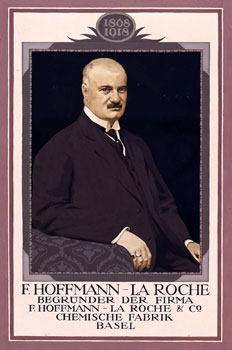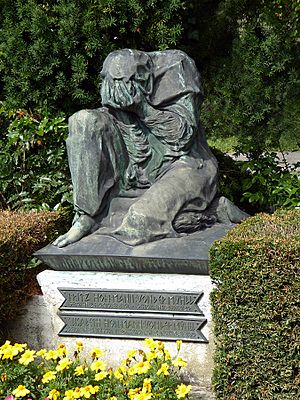Fritz Hoffmann-La Roche facts for kids
Quick facts for kids
Fritz Hoffmann-La Roche
|
|
|---|---|

50th birthday picture
|
|
| Born |
Fritz Hoffmann
24 October 1868 Basel, Switzerland
|
| Died | 18 April 1920 (aged 51) Basel, Switzerland
|
| Nationality | Swiss |
| Other names | Fritz Hoffmann-von der Mühll |
| Occupation | Businessman |
| Spouse(s) | Adèle La Roche Elisabeth von der Mühll |
| Children | Emanuel Hoffmann Alfred Hoffmann |
| Relatives | Luc Hoffmann (grandson; son of Emmanuel) |
Fritz Hoffmann-La Roche was a clever Swiss businessman. He lived from 1868 to 1920. He is famous for starting a big medicine company. This company is known today as F. Hoffmann-LaRoche & Co. Later in his life, he was also known as Fritz Hoffmann-von der Mühll.
Growing Up in Switzerland
Fritz Hoffmann was born in Basel, Switzerland. His family was well-off and important in Basel. They helped him get started in the business world. They gave him chances to learn and also invested money.
Before starting his own company, Fritz gained a lot of experience. He worked at a bank to learn about money. He also worked at a pharmacy and with companies that sold chemicals. This helped him understand different parts of the business.
Family Life
On May 2, 1895, Fritz Hoffmann married Adèle La Roche. She was born in 1876. In Switzerland, it was common for married couples to join their last names. So, Fritz became known as Fritz Hoffmann-La Roche.
Fritz and Adèle had two sons together. Their first son, Emmanuel, was born in Basel on May 4, 1896. Their second son was Alfred, born on July 25, 1898. Fritz and Adèle later divorced in 1919. After that, Fritz married Elisabeth von der Mühll.
Starting a Business
In 1894, Fritz Hoffmann started his first company. He partnered with Max Carl Traub. Their company was called Hoffmann, Traub & Co. They made a small number of medicines and chemical products.
Fritz's father provided most of the money to start the company. Max Traub brought some special ideas and agreements. In 1896, Max Traub left the company. Fritz then changed the company's name. It became F. Hoffmann-La Roche & Co.
How the Company Grew
Fritz Hoffmann was very interested in telling people about his products. He paid close attention to all kinds of advertising. This included simple ads and how the product looked in its packaging. He also promoted important people like pharmacists.
Fritz also built connections with people around the world. This helped him get raw materials for his products. It also helped him sell his medicines in many places. He also supported new research to create better products.
These smart business ideas helped his company grow a lot. Even after the challenges of World War I, the company recovered well. Fritz retired from the company's board in 1919. He was not well and sadly passed away the next year.
 | Lonnie Johnson |
 | Granville Woods |
 | Lewis Howard Latimer |
 | James West |


